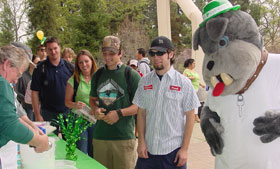Jan and Bud Richter Center
Impact of Service-Learning
Reflection & Assessment of Service-Learning’s Impact on Students

Secondly, you would want to employ a formative assessment with reflection during experience. Methods used to assess learning during the experience often center on journals, critical incident reports, and discussions. However, there are a many other techniques
you could use such as problem-based learning, audio-visual presentations, and others.
Finally, you’d probably want to provide a summative evaluation in the form of a reflection after experience. A variety of methods can be used to assess a service-learning experience. It is important
to include an element of that assessment targeting the quality of the experience.
Much like we ask students to evaluate instructors, we should enlist their input into
the quality of their agency.